“Respond aims to deliver 1,000 social homes and 250 cost-rental homes annually from the end of 2024”

Respond’s recently-appointed Director of Investment and Development, Parag Joglekar, oversees over €1.5bn in housing under construction. Having been with the AHB for over 20 years, he is well acquainted with the complexities of delivering social housing at scale.
Established in 1982, the approved housing body (AHB) Respond has built more than 7,000 units nationwide over the years, providing homes for families and individuals who need them. The organisation also provides community services, such as learning and school-age care, day care for older people, family support, refugee resettlement and family homeless services.
Over the past five years, Respond has commenced 3,347 homes with a value of just over €1.03bn. It currently has 1,433 new homes under construction, with construction schemes ranging in value from €15m to €65m and total programme value in excess of €1.5bn.
As a direct response to Housing for All, the Respond board, in a mid-term review of its strategic plan, set out an increased delivery target. This included aiming to deliver up to 1,000 social homes and 250 cost-rental homes annually from the end of 2024.
Parag Joglekar , Director of Investment and Development, Respond
Respond’s director of investment and development, Parag Joglekar, joined the AHB in 2001. He is a registered architect in Ireland and the UK. He has over 25 years of experience in urban design, private and public housing, regeneration, commercial projects and risk and asset management, in addition to managing design and construction contracts across Ireland, the UK and India.
Joglekar leads Respond’s multidisciplinary development team of 20 construction professionals, responsible for its social and cost rental homes building programme.
He explains that Respond’s core goal is to create a positive future for people by alleviating poverty and creating vibrant, socially integrated communities.
“We achieve this by providing access to education, childcare, community development programmes, family support, early learning and school-age care, day care for older people, family homeless services and refugee resettlement,” Parag Joglekar comments. “When people receive the keys to their new home from Respond, this marks the start of a life-long relationship that they will have with us. Each of our developments is assigned a tenant relations officer who works with tenants so they become part of a community. The Respond housing team oversees asset management services, addressing maintenance and other related issues.”
Joglekar notes that being a large social housing provider allows the Respond team to get involved in some really innovative work.
“We are, for instance, partnering with the Global Brain Health Institute (GBHI) to deliver what we believe is a first – a Brain Health Village. This is a pilot project from which we hope to use the learnings for all our tenants.”
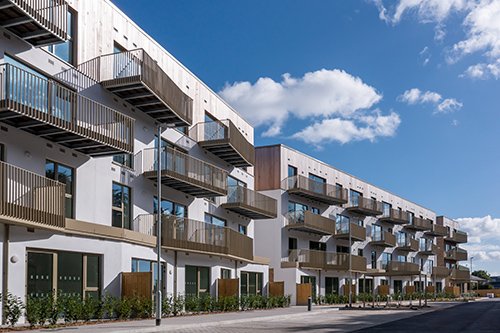
Housing for All
Parag Joglekar believes that the biggest opportunity to come out of Housing for All for AHBs is the provision of multi-annual funding with a substantial government investment of €4bn per year until 2030. “Providing everyone is operating in a stable economic environment, such an investment by the State has the potential to address the core objective of Housing for All.
“As a result of Housing for All, we have an opportunity for innovation and greater collaboration between the private, voluntary and public sectors to deliver real change through planning and procurement reform, addressing the need for multiple models for housing demand-access-affordability, investment in communities, social inclusion, climate agenda, social and physical infrastructure.
“As an AHB, Respond has a central role to play to support the delivery of the Housing for All plan, including the development of cost rental homes.”
Joglekar acknowledges that Housing for All also presents several challenges for AHBs.
“Aside from the essential aspect of financing, the delivery of Housing for All will depend on the commitment and collaboration of its key stakeholders,” he comments. “The ambition of Housing for All means it will require continuous monitoring of its targets. As with any plan, flexibility is important to facilitate agility and adaptability in an ever-changing economic context. This must be supported through legislative and financial interventions, as and when required.”
He continues, “It will be critical to balance the various facets of planning measures, development viability and facilitating physical infrastructure. This is the biggest challenge in the midst of high inflation and the overall context we are operating within.”
He believes that aligning objectives between the National Development Plan (NDP) and National Planning Framework (NPF) will also be critical, as the focus should not be on housing delivery and targets alone.
“In Respond, we firmly believe that the success and sustainability of any development depend on access to key social and physical infrastructure and, in particular, transport, utilities, schools, hospitals and local economic and commercial zones, which in turn contribute to the sustainability and climate agenda.”
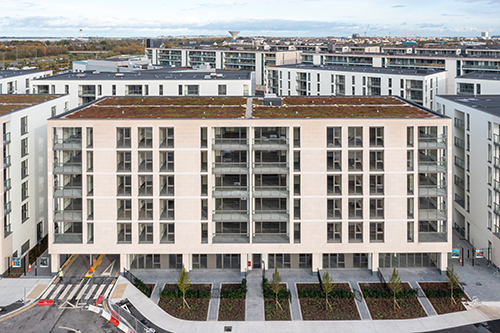
Respond housing delivery models
Parag Joglekar recognises that the private sector, developers and builders have a central role to play in helping deliver various social housing.
Respond’s housing investment programme includes various models for the delivery of social and cost-rental housing. One of these strands is engagement with the private sector to deliver homes.
“We partner with the Irish Home Builders Association (IHBA), Construction Industry Federation (CIF) and other stakeholders, which accounts for just over 80% of our delivery programme,” he explains. “The majority of our delivery is new construction where Respond acquires the site and facilitates financing of construction stage payments in accordance with specified deliverables. This forward funding model has unlocked sites to deliver new housing, which otherwise would have been unviable because of financing costs. Developers and builders submit proposals for new housing schemes in response to our Request for Tenders. This tender process is advertised through the eTenders portal. Following the assessment of proposals, including support from the relevant local authority in terms of housing need and demand, tenders are put forward for review and approval by the Respond executive, development board subcommittee and finally, our board.
“Once Heads of Terms are issued, we commence contract and funding stages with a view to begin construction and deliver schemes based on agreed programmes.
“In addition to our own technical team, we engage the services of external registered architects, planners, chartered quantity surveyors for cost validation, chartered fire engineers and building surveyors and any other specialist consultants through various project stages.”
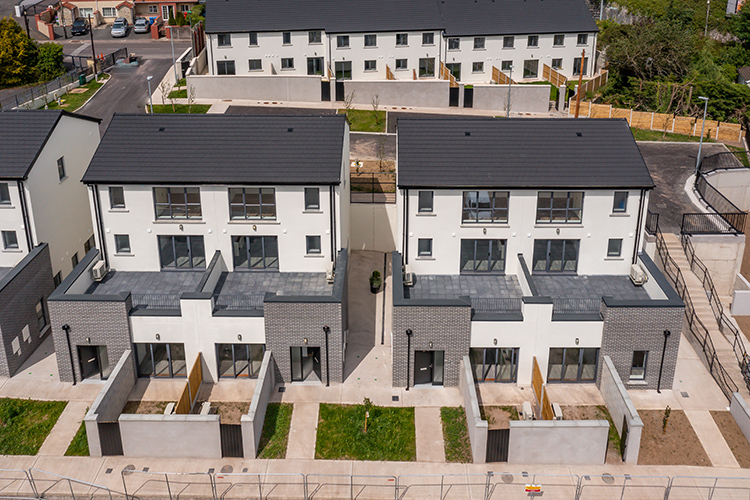
Respond house funding models
Joglekar says that the Capital Advance Leasing Facility (CALF) continues to be the primary source of facilitating the delivery of social housing, with the remainder of funding, in the case of Respond, coming from the Housing Finance Agency plc (HFA).
“Respond recognises the vital role that the HFA plays in facilitating the delivery of new housing for local authorities and AHBs through its lending. CALF is currently undergoing refinements to facilitate some of the current risks and challenges in the market pertaining to viability, such as inflation and interest rate increases.
“96% of Respond’s development pipeline is funded through CALF and 2% through Cost Rental Equity Loans (CRELs), with the remainder funding coming from the HFA.
“This is debt finance over periods ranging from 20 to 30 years. Only 2% of our development pipeline is funded through a grant under the Capital Assistance Scheme (CAS), which facilitates housing for specific tenures such as older persons, persons with disabilities, homelessness, etc.”
Land availability
Joglekar notes that providing access to public land is a key aim of Housing for All, but it also needs to be serviced land.
“While it aims to make public land available for building new homes, there are measures set out for zoning of serviced land that allow housing demand and need in the local area to be met. Respond is currently involved in developing projects on land made available through local authorities and the Housing Agency.
“Access to land has either been through local authority Expressions of Interest (EOI) or existing sites in land aggregation schemes where Respond was previously involved.
“Across these sites/land parcels, Respond is working with relevant local authorities to secure planning grants either through a standard planning permission or through a Part VIII planning process.
“Upon securing of planning permission, Respond undertakes further detailed design development, tenders schemes under public works contracts and progresses delivery by securing funding through CALF-PAA, CREL and HFA funding or grant under CAS funding.”
Private sector collaboration
In addition to the current 1,433 homes on various sites, Respond is hoping to commence a number of new schemes throughout 2023 and 2024. Its development team is working to initiate the construction of an additional 1,350 homes with planning in its existing development pipeline.
Housing for All has increased engagement between Respond, developers and builders.
“Respond’s engagement with the private sector – developers/builders and main contractors has increased significantly since the launch of Housing for All,” Joglekar notes. “Our development team is involved in many projects in urban and non-urban areas with developers and builders of varying size and capacity. The projects can range from complex schemes involving varied housing typologies and tenures to straightforward housing schemes on greenfield or brownfield sites and/or regeneration areas. Respond has also been involved in repurposing existing buildings into new homes.
“We are working on viability assessments on several new schemes nationwide that can potentially deliver social and cost rental homes. All of this work is through the support of local authorities, the Department of Housing, the Housing Agency, HFA, IHBA, CIF and other stakeholders.
“As Respond works to add to the national housing stock, our focus remains on new construction to deliver cost rental and social housing.”
Changing technologies
Over the past few years, Parag Joglekar says that he has noted an increased awareness and desire by various stakeholders to engage in modern methods of construction (MMC).
“This has been most notable in urban areas across larger sites involving apartments and, in some instances, standard houses,” he comments. “We have seen early engagement, from planning stage, between developer, design teams and main contractors, as well as specialist subcontractors. This engagement or collaboration focuses on the speed of delivery of new homes, quality control, health and safety and environmental performance. “Some of the schemes developed for Respond have included the use of prefabricated wall panels, balcony systems for apartments and bathroom pods,” he adds.
”Some traditional housing units we have developed have also been manufactured offsite utilising timber frame. We are currently working on a large apartment scheme where composite architectural wall panels are being used. These wall panels are being designed and manufactured in a coordinated approach using BIM. This requires collaboration between our design team, the main contractor and specialist subcontractors. “In addition, the scheme incorporates bathroom pods, currently in production.”
Joglekar believes that while MMC has many benefits, several challenges exist, including perceptions of build types, the need for scale/volume, understanding the maintenance of such buildings and contribution to placemaking.
“Procurement methodologies also need to be further refined to allow the adoption of MMC from an early design stage. An appropriate procurement methodology and securing relevant warranties must be facilitators and not hinder adoption of new construction technologies.”
Sustainability
Finally, much has changed in the social housing sustainability space in more recent times. “The Respond development team have a heightened awareness of reducing carbon emissions throughout a building’s life cycle from the initial design to the refurbishment or eventual disposal of a building,” Parag Joglekar explains. “On all of our projects, we now work with designers, contractors and other stakeholders to assess the carbon footprint of our buildings. This is then used to plan an effective reduction strategy through all stages of the building life cycle.”
The sustainability assessments are carried out across the following categories:
- Product stage,
- Construction stage
- Use stage (includes maintenance, repair, refurbishment and replacement),
- End of life stage, and
- Beyond building life cycle (Promoting circular economy).
“As an organisation operating for over 40 years, a significant proportion of Respond’s stock is over 25 years old. It is essential that we maintain and improve these homes so that our tenants can continue to enjoy them.
“Energy efficiency and providing warm and affordable homes continues to be a priority for Respond. In 2022, we invested another €1.5m in our energy retrofit programme, utilising matching funding from the Sustainable Energy Authority Ireland (SEAI), raising the overall investment in the year to over €3m. Our total energy retrofit investment over the past 10 years is in excess of €34m. Improvements in our retrofit programmes included renewable heating, windows, doors and insulation upgrades,” he concludes.
Recent Respond Projects
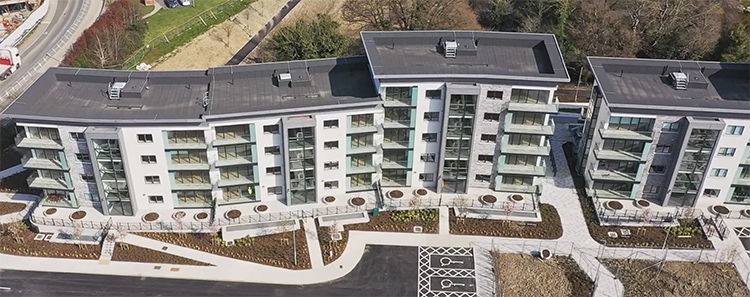
- First purpose-built cost-rental homes – Woodside, Enniskerry Road, Dún Laoghaire-Rathdown
Respond delivered the first purpose-built cost-rental homes in Ireland as part of a mixed tenure development on Enniskerry Road in Dún Laoghaire- Rathdown.
This project resulted from an innovative collaboration between Dún Laoghaire-Rathdown County Council, the Housing Agency, the Housing Finance Agency, the Department of Housing, Planning and Local Government, Respond and Tuath Housing Association. Respond was the main employer of the scheme, and it worked with the stakeholder partners to deliver 155 social and affordable homes and is now managing the homes for tenants, together with Tuath.
The scheme won awards at the National Property Awards 2022 and the Chartered Institute of Housing Working in Partnership Awards 2022.
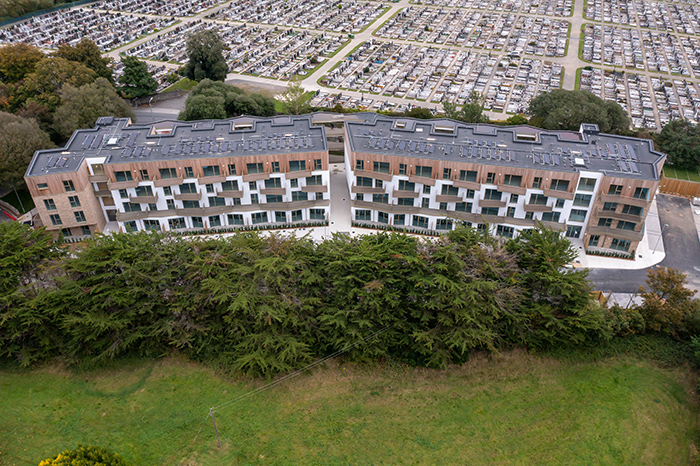
-
Sustainable social housing – St Doolagh’s Oaks, Malahide Road, Dublin
The St Doolagh’s Oaks housing scheme comprises 29 homes in a mix of one-, two- and three-bedroom apartments. The scheme is located close to retail and public facilities, including schools, health services and sports venues. All 59 units have air-to-water heating systems installed along with photovoltaic (PV) panels on the roof, green roof structures and heat recovery heating.
This development is an exemplar scheme showing that sustainability does not have to be beyond the realm of social housing.




